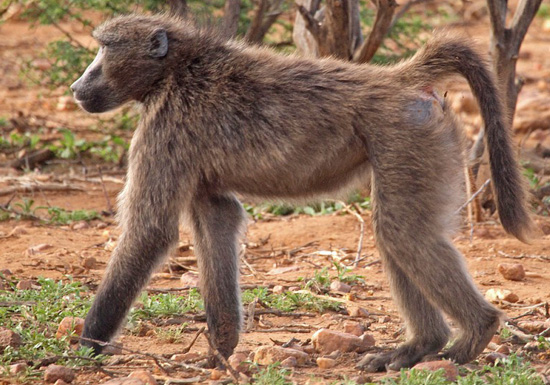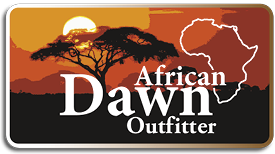Although baboons are a protected species they are generally seen as pests as they are very destructive to lodges and homes.
Year round we offer you the opportunity for hunting Baboon trophies. There are no seasonal restrictions on hunting Baboon in Namibia, which makes it a suitable trophy through out the year.
The African Baboon is a large primate with a dog-like face and large, prominent canines. Baboons do not have a definite breeding season and are sexually active throughout the year. African Baboons are preyed upon by Leopard and Cheetah. It is known that Baboons will viciously attack their predators when threatened. Baboon troops can be up to a 100 strong, and have a well-developed and complex social structure.
The Baboon is Omnivorous and under natural conditions they feed on wild fruits, seeds and insects. On occasion they will feed on the flesh of small mammals and birds. Because troops are inclined to raid commercial crops, baboons are not popular with maize and fruit farmers.
Baboons have also been known to eat the young of sheep and goats, and are fond of raiding crops, such as common sunflowers and alfalfa. They have an almost vermin status in farming areas through out Africa. They are often the hunter’s worst enemy, giving away ones position with their loud two syllable “ Bog-Gom!” alarm calls.
Hunting Baboon can be very difficult, because they live in a way that protects them from predators. They are very social and are constantly in groups, making it fairly easy for them to avoid or intimidate predators, such as humans who are hunting them.
A shot to the upper body should accomplish your purpose when hunting Baboon. However, keep in mind that stealth is important, as baboons will let out alarm calls if they sense your presence. This will cause all of the baboons in the area to move far away very quickly. Shooting distance is reasonably between about 100 and 150 yards, and it is important that you are sitting in a blind and not making noise as they will take off at the smallest sound or other movement.
When hunting Baboon, set up a blind along their daily path between their roosts and feeding grounds, and wait for them to come in your direction.





